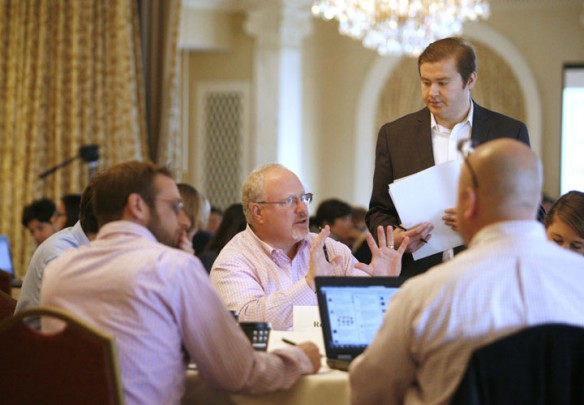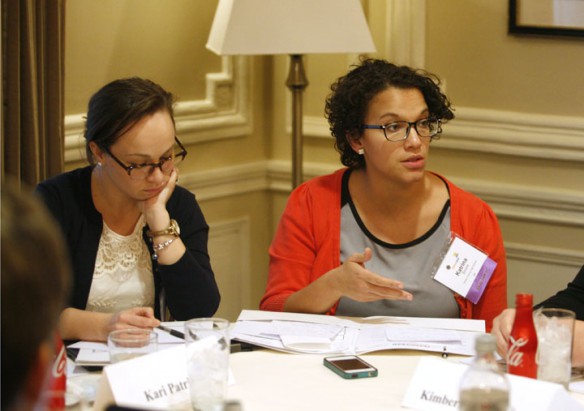
Rowan Claypool, center, founder of Teach Kentucky, makes a point during a discussion at the Kentucky Teach to Lead Leadership Summit in Louisville.
Photo by Mike Marsee, Dec. 6, 2014
By Mike Marsee
michael.marsee@education.ky.gov
A group of teachers who believe they don’t have to leave the classroom to lead in their schools shared and reshaped those ideas earlier this month at a first-of-its-kind conference in Kentucky.
The Kentucky Teach to Lead Leadership Summit brought together about 100 teachers and 40 other supporters as part of an initiative of the National Board for Professional Teaching Standards and the U.S. Department of Education (USED) to promote teacher leadership opportunities, particularly those that allow teachers to remain in the classroom.
“I have always been really interested in ways to lead from the classroom and to not feel like I have to leave my kids,” said Katrina Boone, an English teacher at Shelby County High School. “They’re the reason I came to the profession, so it’s pretty sad to me that to get a promotion I would have to leave my kids. The idea of teacher leadership is to effect change on a larger scale but be with my kids every day, and I really love that, and that’s why I’m a teacher.”
Angela Gunter, an English teacher at Daviess County High School, said she is exactly where she wants to be.
“I have a doctorate in educational leadership, but I don’t feel called to do anything but stay in the classroom,” Gunter said. “People keep saying, ‘When are you going to be a principal?’ but I don’t want to be a principal. I want to be a classroom teacher, but I do want to pursue other avenues of leadership and to share some of our experiences with other teachers.”

Katrina Boone, right, an English teacher at Shelby County High School, discusses her team’s proposal during the Kentucky Teach to Lead Leadership Summit in Louisville as Kari Patrick, another English teacher at Shelby County who was part of her team, listens.
Photo by Mike Marsee, Dec. 6, 2014
Louisville hosted the first of three Teach to Lead summits; the others will be in Denver next month and Boston in February. Both organizers and participants in Louisville said it went even better than they had hoped.
“It’s been exciting to see the energy in the room, teachers having great conversations and working with each other to think about how they can implement their change ideas,” said Cindy Parker, director of the Division of Next-Generation Professionals at the Kentucky Department of Education (KDE).
It was no accident that they came together in Kentucky. Maddie Fennell, a USED classroom teacher fellow from Omaha, Neb., and the lead organizer of the event, said she saw in a visit to Kentucky earlier this fall that the state is ahead of many others in implementing teacher leadership.
“It was so impressive to me that many other organizations that I’ve met with are such at the beginning stages of, ‘How do we get started? Who do we need to reach out to?’ This group, you could tell, had already done all that work,” Fennell said. “Their whole thing was, ‘How do we maintain what we have?’ and ‘How do we spread what we have?’ And they jumped in immediately. They were all excited about being involved.”
Fennell said that included Education Commissioner Terry Holliday, who spoke briefly to welcome teachers to the summit.
“Several people from other states came up and said, ‘Wow, he’s impressive. You’re so lucky,’ and I said, ‘We know!’ ” Gunter said. “We know that he is very innovative and rewards innovation, and we feel lucky to be in Kentucky. To be a Kentucky teacher right now is the greatest time.”
About 75 of the attendees were Kentucky teachers or supporters. The summit’s supporting partners included the Kentucky Education Association, Hope Street Group, the Network to Transform Teaching, the Fund for Transforming Education and KDE.
Participants submitted ideas for implementing teacher leadership that were reviewed by a team of teachers, and those whose ideas were selected – there were 32 in all – presented them to small groups either individually or in teams of two to five teachers.
“There’s been an extraordinary level of guidance and leadership in the rooms,” said presenter Rowan Claypool, the founder of Teach Kentucky, a Louisville-based teacher recruitment program that had eight participants at the summit. “I wish we could have stayed with them a little longer, but the quality of facilitators and supporters has been very good.”
As ideas were discussed and dissected, they frequently took on new forms.
“Of the teams that I’ve worked with, most of them have refined their ideas from having conversations with each other and from the workshops we’ve had,” Parker said.
Claypool and four colleagues presented a proposal that would create a two-year induction process for alternative-route teachers in hopes of retaining more of them. It evolved over the course of the summit.
“Very specific refinements,” he said. “There’s been some good information, particularly in the resource session that I attended. That was very instructive and helpful. We’ve narrowed our focus, which made our proposal much more specific, and I think that will enhance it.”
Boone and some of her colleagues from Shelby County presented an idea on distributed leadership that also underwent some changes. Her proposal focused on creating teams of teachers that could share their ideas and expertise and would ultimately have decision-making power that traditional teacher committees do not have.
“I came here dreaming big, and today I’ve developed some ways to start small and focus so that dream can come true someday, and I think that’s a really good balance to have,” she said.
Leslie Bartow and Gwen Courtney, who are curriculum specialists in Henderson County, brought a proposal to pair prospective teacher leaders with mentors to prepare them for leadership positions. They were thrilled to discuss their idea with Matthew Courtney of the Bluegrass Center for Teacher Quality, who offered to come to Henderson to help them.
“We feel like this is really meant to be, and we feel like nobody can turn us down,” Bartow said. “He’s really helped us fine-tune and get a strategy in place for how we can go back and present that, and he’s going to come to our district and help us – for free.”
Several Kentucky teachers said their schools and districts are open to implementing teacher leadership.
“Our district is ready to look at innovative opportunities for teacher leadership,” said Jana Bryant, the math staff developer for Daviess County Public Schools.
Parker said the supporters at the summit stand ready to help now that the teachers have taken their ideas back home.
“I think there will be both a formal and an informal network that comes out of this, and all of the people that are serving as facilitators and supporters of the work like the Department of Education are available both to provide feedback and support, but also to check in and follow up to see what’s needed to help put the ideas in motion,” she said.
The teachers said they were grateful for the opportunity to network and to talk about their ideas with others who might already have tried them or might look at them from a different angle.
“It’s nice to be here and feel like a professional,” Boone said. “Doctors and lawyers have these sorts of conferences all the time, and the National Board of Professional Teaching Standards and the Department of Education have done a great job of making us feel like that same sort of important professionals.”
MORE INFO …
Leslie Bartow leslie.bartow@henderson.kyschools.us
Katrina Boone katrina.boone@shelby.kyschools.us
Jana Bryant jana.bryant@daviess.kyschools.us
Rowan Claypool rowan@teachkentucky.com
Gwen Courtney gwen.courtney@henderson.kyschools.us
Angela Gunter angela.gunter@daviess.kyschools.us
Cindy Parker cindy.parker@education.ky.gov



Leave A Comment